July 2002 (Part 3)
SELECTION OF QUESTIONS AND ANSWERS
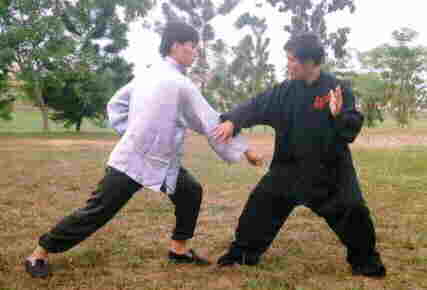
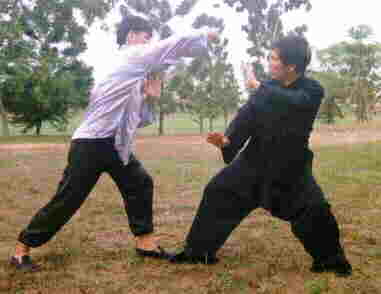
Taijiquan is a martial art. In the photographs above, Sifu Wong brushes off Tai Chee Yong's thrust punch. Immediately Tai Chee Yong “leaks” his hand over Sifu Wong's defence and attacks with a “horn punch”. Sifu Wong shifts his body backward to avoid the attack.
Question 1
I am writing to ask a few questions on some things that have been on my mind since the chi kung course in Bath on Saturday and Sunday less than one week ago. Firstly, I seem unbelievably happy all the time. Is this normal, or I am putting loads of chi into some happiness zone and making myself unnaturally happy, or doing something wrong generally? I'll elaborate on this below.
— Tim, England
Answer
It is normal and natural to be happy after practising chi kung learnt from me. Do you remember that after Standing Meditation — during the “Dan Tian Breathing” course, I think — I asked how many people felt happy and free, almost every one put up his hand? Do you remember I told the class that the Chinese term for being happy was “kai xin” (“hoi sim” in Cantonese), and I explained that this term came from chi kung? “Kai xin” literally means “open heart”, and if you practice high level chi kung, the chi flow opens your heart, making you happy.
It is natural to be free and happy because the Original State is freedom and happiness. The Original State is also called Buddha Nature. In Western terms it is called God. In prosaic terms it is the undifferentiated universal spread of energy.
Then, why are some people not free and not happy? These people often blame God, saying that God has been unfair to them. Actually God's freedom and happiness is for everybody, but these people block themselves. Their blockage can be physical, emotional, mental or spiritual.
How do they block themselves? When they tense their muscles, for example, they block themselves physically. When they cling to anger or anxiety, they block themselves emotionally. When they have doubt whether they can be free or happy, they block themselves mentally. When they harbour evil intentions, they block themselves spiritually.
Because of blockage, their energy network becomes distorted and universal chi cannot flow smoothly, resulting in pain, illness and depression. In religious terms, they block themselves from the Grace of God. Practising genuine chi kung enables them to clear their blockage, thus restoring the original flow of universal chi, or God's Grace, through them.
These are not empty words. These words are explanation of what has happened. First we have the experience, then we use these words to explain the experience. I am now in Toronto, and I have just completed a Dan Tian Breathing course here. This morning I asked the class how may of them felt free, happy and energetic. Almost all students put up their hands.
Question 2
I seem to feel stupidly happy all the time now. It is almost ridiculous. I look in awe at the garden at night and walk about in it just appreciating the feeling of night-time. Insects land on me and instead of brushing them off I feel like they're my friends. I feel waves of joy pass through me just walking around work. People are rude to me and I find it amusing.
Answer
Tim, you may not realize it, but you are one of the very few people in the whole world who have learnt and benefitted from an elite art. A lot of people learn chi kung, but only a very few have the opportunity to learn genuine chi kung, i.e. chi kung whereby you can purposefully work on energy and derive the benefits which chi kung classics say practising chi kung will give.
Fewer still have the opportunity to learn genuine Shaolin Chi Kung. What is so special about genuine Shaolin Chi Kung? It was the type of chi kung taught in the Shaolin Temple, which had been the imperial temple for all the emperors of China.
The elite chi kung has opened your heart and purified your spirit. Hence, you are joyful all the times, and at peace with yourself and with the whole cosmos. Actually, to be joyful and peaceful is natural. But many people find this odd because, due to habitual stressful living and other factors, they have been conditioned to be tensed, anxious and even depressed.
They also find it hard to believe elite chi kung can give such good results so quickly because most of them are used to degraded versions of chi kung where its essence has been lost. You may have an idea how degraded chi kung has become when you find that typical practitioners may have practiced chi kung for many years yet have no experience of chi, or that some people think they can teach chi kung to others after having learnt it from a book.
Question 3
The greatest problem with this is that I don't feel I want to work at all! I want to go outside and be in the gardens and just walk about near the trees, or be with my girlfriend. I also feel a little light-headed sometimes.
My girlfriend says it doesn't sound like a problem at all, but a blessing and I should enjoy it, but I'm worried that people are going to start thinking I'm simple and that friends won't know how to react to me being this happy, and that it isn't conducive to work. In fact it's almost scary as I can't be sure I'll return to normal again. It feels like I've taken an ecstasy pill or something... Is this a normal reaction to have?
Answer
Your reaction is quite normal, like someone who has laboured all his life yet is poor, and now he finds himself suddenly with a lot of money. It is normal if he does not want to work, and just enjoys himself with his new-found wealth.
But you have to check yourself against this abuse. Although you have a lot of money or a lot of energy, you still have to work. Now, with plentiful of energy and freshness of spirit, you do not labour at your work, you enjoy it.
Your girlfriend is right — you are blessed. But you are mistaken to worry that people will think you simplistic and friends will find it hard to relate to you when you are happy. In fact the opposite should cause you concern. If you are complicated and unhappy, people and friends will find it hard to work with you.
Simplicity is a virtue, and being happy is a much sought after goal. As you have already known and experienced, the chi kung exercises which give you these wonderful results are very simple. Indeed, many students have expressed amazement that such simple exercises can give such profound results.
Being happy is conducive to work. You should also work for other people's happiness. One sure and simple way to do so is to be kind to them. It is normal to be happy and healthy. Do you want to be sad and sick all the time, or most of the time? That will be abnormal. Clear your mental blockage and enjoy your happiness, good health as well as work all the time.
Question 4
I've been amazed by some of the things I've witnessed from practising chi kung myself this short time (barely a week) — muscle aches disappearing, old-broken bones and bones at back re-aligning, feeling happy all the time. It seems so wonderful that I want to teach my parents and my friends, especially those with medical problems, but I'm worried that I'm not a master like yourself and I won't have the expertise to teach them correctly. Worse, I might actually do more damage than good
Answer
Many people have been amazed. Most of the students in the same courses you took, as well as in all my other courses, with the exception of those who had learnt from me before, were amazed. In Bath, just before I left, a woman student came up to me to thank me, and said it was like magic. Her results were beyond her imagination.
But if you tell other people, including your friends, because you care for them and want them to have similar wonderful benefits too, they would not believe you, they would think you wanted to sell the courses for me. If you tell them how much you paid for the courses, they would think you are crazy. If you said you would gladly pay ten times the price for the benefits you got, they would think you were really mad.
Why is this so? Mainly because they think the chi kung I teach is just like any other type of chi kung they find on the market, perhaps a bit better but not much. They simply have no idea how fantastic genuine Shaolin Chi Kung is.
You are right and wise to say that you would not teach your friends although you want them to have the wonderful benefits you have experienced, because you are not a master. It is not so much the techniques I teach, but the skills of my teaching that enable my students to have wonderful benefits.
But you can teach your friends if you want to. The best exercise to teach them is “Lifting the Sky”. Of course they will not have the same wonderful benefits that you have, but they will still get good benefits. If they have been sickly and weak all their life, they may find the benefits fantastic. But if you were to tell them that had they learnt from me personally, the benefits will be a hundred times more, they would be unable to imagine how that could be possible.
Question 5
I know you have talked about damage that can be done if techniques are performed wrongly. But it seems almost shameful to have knowledge of something so powerful and great that could improve their lives and not share it with them. What might your advice on this be?
Answer
Your thinking is idealistic but immature. It is not that we do not want to share our wonderful art with them, but it is that they do not want it. If I were selfish, I would not have taught such a wonderful art in public.
Indeed, it is almost ridiculous how I have made the art available to people who want it. In the past, masters might not teach such an art to their daughters, and selected disciples would prostrate themselves to the masters for a chance to learn it. I am so liberal that I am now teaching it to people whom I do not even know. If they cannot even make an effort to come to my course, pay the fee and practice the way I teach them, I do not want to waste my time on them, I would spend my time helping those who are deserving.
My advice is that anyone who wants good health and happiness must work for it, just as anyone who wants his monthly salary must work at his job, or anyone who wants a new car must buy it. Salaries and new cars are not given freely to whoever who raises his hand. There is no shame if you do not share your salary or new car with your friends. By most standards, good health and happiness are more desirable than monthly salaries and new cars, and it is easier to attend my course to have good health and happiness than work the whole month to earn a salary or save a few years for a new car.
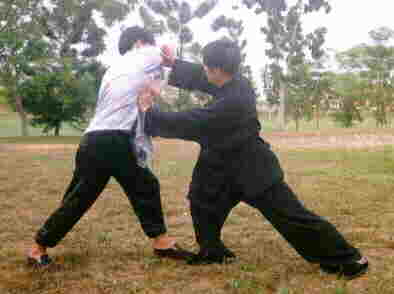
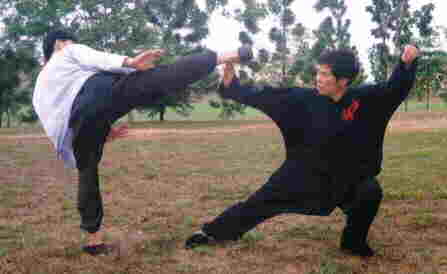
As Tai Chee Yong's horn attack passes him, Sifu Wong responds with “Jade Girl Threads Shuttle”, striking Tai Chee Y ong's ribs. Tai Chee Yong moves his left foot diagonally forward to his left side and attacks with a side kick. Sifu Wong responds with “Low Stance Single Whip”.
Question 6
If you don't mind my asking, is it possible to use Standing Meditation, Chi-Induced Free Movement, or “Swaying in the Breeze” at the end of any chi-kung exercise to 'wind-down'? I remember doing Chi-Induced Movement a lot, but the other two occasionally and am unsure when each is appropriate.
Answer
There is no need to warm up or wind down in chi kung; you can start or end any exercise straight away.
Standing Meditation and Self-Manifested Chi Movement are complete chi kung exercises by themselves. That means you can practice only Standing Meditation or only Self Manifested Chi Movement for the whole of your training session, or you can combine them with other exercises. We normally complete our chi kung training, irrespective of the exercise we perform, with a minute or two of Standing Meditation where we focus our chi at the dan tian.
“Swaying in the Breeze” describes a chi kung situation or technique whereby the practitioner is totally relaxed, and the chi flow inside him sways him to move gently. This is usually employed after performing a dynamic chi kung pattern like “Lifting the Sky”.
There is no hard and fast rules in chi kung. Once you have understood some basic principles, you may employ chi kung techniques in whatever ways are suitable.
Take Self Manifested Chi Movement and “Lifting the Sky” for example. You can practice either one of the two exercises by itself for 15 minutes, or you can choose any one of the following combinations.
- Lifting the Sky for 6 minutes, Swaying in the Breeze for 6 minutes, and Standing Meditation for 3 minutes. (This was the approach you learned at the chi kung course in Bath.)
- Self Manifested Chi Movement for 12 minutes, and Standing Meditation for 3 minutes. (This is also the approach you learned in Bath.)
- Lifting the Sky for 12 minutes, then Standing Meditation for 3 minutes.
- Lifting the Sky for 3 minutes, then Standing Meditation for 12 minutes.
- Lifting the Sky for 5 minutes, Self Manifested Chi Movement for 7 minutes, then Standing Meditation for 3 minutes.
- Standing Meditation for 3 minutes, Swaying in the Breeze for 5 minutes, and Self manifested Chi Movement for 7 minutes.
Which approach will give you the best benefit will depend on a few factors like your needs, the purpose of your practice, and your level of attainment.
Question 7
I must admit I was sceptical on coming to your course, and was only hoping to generate a nice chi-flow (which I haven't truly felt before) to use in martial arts and Tai Chi, but the amount of amazing things which occurred was truly astounding. I literally felt bones on my back pop and crack and re-align — which was an odd thing to feel in the first place, especially since my back was completely relaxed and I was virtually stationary.
Answer
Many students were amazed at the effects they experienced and the benefits they obtained at my chi kung courses. Some of these effects included needles prickling at their fingers, seeing bright beautiful colours, hands charged with energy, feet becoming very warm, electric sparks flowing all over their body, streams of energy flowing inside them, energy loosening or opening their joints, energy moving up and down their spine, energy massaging their internal organs, and feeling a ball of energy at their dan tian.
Some of the benefits they obtained were feeling calm and relaxed, overcoming pain, being revitalized, having more energy at the end of a few hours of training, being able to sleep soundly, finding the surrounding brighter and more beautiful, experiencing inner pease, feeling of joy and freedom.
Actually one needs not be surprised at these effects and benefits, as they are the expected results of practising genuine chi kung. This fact has been amply recorded in chi kung classics. The trouble is that what most people practice today is not really chi kung, but just external chi kung forms. Hence, they never have these effects or benefits although they may have practiced for many years. What is really amazing is that most students in my courses experienced these effects and benefits on the very first day of their training with me, although normally it would take practitioners of genuine chi kung a few months to have these effects and benefits.
Question 8
I had a sprained neck twice from bad posture at work, and both times I made it vanish in 5 minutes! Normally I would just wait for it to go and try to massage it a little and it would stay for 5 hours minimum, but 5 minutes! “Carrying the Moon”' cured it completely. The first time I did this (Tuesday), I literally exclaimed out loud “my God, this is unbelievable”. I was only expecting it not to ache quite so much, but not vanished! Aching arms from martial art practice become normal arms after 5 minutes of “Lifting the Sky”. It was truly amazing.
Answer
Overcoming pain is the forte of chi kung. Not only you chose an excellent chi kung exercise for the purpose, you also performed the exercise very well. Hence, you overcame the pain at your neck and arms easily.
This is an important point for many people to know. They think mistakenly that if they have pain at their neck or arms, and if they do what you did, their pain would go away. It won't. Why? Because they do not perform the same exercise the way you did. You performed “Carrying the Moon” as high level chi kung, but they perform “Carrying the Moon” as gentle physical exercise.
This is the big trouble with many people. They mistake chi kung as gentle physical exercise. Hence, they think that learning chi kung from a book, a video, an e-mail or a mediocre instructor is not much different from learning it from a master.
Question 9
I accidentally referred to you as “Sifu Wong” during the course. I only read just now that this is 'formal' or distant and might be considered rude in this respect, for which I'm sorry. In England it would be insulting to talk to someone not your peer with familiarity like that, and as a sign of respect you would use their full title.
A teacher would always be called 'Mr.Smith,' for example and not “teacher”, untill he indicates you can do otherwise. Hence my mistake. Ironically it was out of respect that I used your full name and didn't shorten it to just “Sifu”, although the opposite effect might have resulted. Apologies once again.
Answer
It was thoughtful of you to explain this to me. But you were not distant or rude; you were polite. Your politeness was indicated not so much from the words you used, but from your tone and intention.
My full name is “Wong Kiew Kit”. “Wong” is my family name or surname, and “Kiew Kit” is my given name. In Chinese names, the family name comes first, and the given name comes later. To call me “Kiew Kit Wong”, “Wong Kiew”, “Mr Kit” or “Sifu Kit” is incorrect.
“Sifu Wong” is the polite term the public usually call me. My students, however, call me “Sifu”. It connotes personal affection. “Sifu” is a compound word from “si” and “fu”, which literally means “teacher” and “father” respectively. Hence, a “sifu” is a “teacher-father” to his students, which means he does not merely teach them skills and techniques, but also ensures that they lead meaningful, rewarding lives.
Question 10
Overall I'm very pleased with the course, and the results have been very unexpected. Health and emotional benefits did not even feature in my reasons for coming in the first place, but now it seems like the best things I've learnt. Thanks very much.
Answer
I am very glad of your results. Continue practising the way you do, and you will be amply rewarded for your time and effort.
You may recall that at the start of the course I told the class they would find the two days of the courses to be two of the best days of their lives. As a “sifu” or “teacher-father”, I did not say words randomly; I had to be sure of substantiating what I said.
I received an e-mail from Christopher, the organizer of the courses, immediately after receiving yours. He wrote, “Certainly, I have never experienced such enthusiasm from students attending a course. For many it has been a life changing experience.” Earlier at Bath he told me that he had spoken to many students and all of them were very happy with their results.
There was, however, one exception. A young man said he was not happy. Without questions, I told Christopher to return him his full fees, which Christopher did immediately.
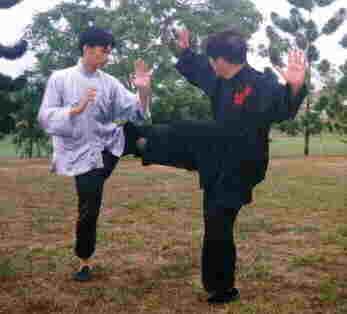
Tai Chee Yong pulls back his leg (please see photographs above), jumps to Sifu Wong's right side and executes a whirlwind kick. Sifu Wong moves diagonally forward to his left and counters with “Cross-Hand Thust Kick”. This thust kick is meant to attack the opponent's groin or dan tian, but in compassion, Sifu Wong attacks the opponent's thigh.
Question 11
I have practised Tai Chi for three years. I have two teachers, Finnish and Chinese. The first one I would call an instructor as you have said, although he is very good one. He is very gentle, open-minded and is a demanding teacher. But he teaches us only “the inner Tai Chi” (chi, meditation etc.) and of course forms. We also train Pushing Hands but only to understand better how chi works in the movement. He tells us the applications and we train them but we don't spar.
— Johanna, Finland
Answer
Sometimes, especially when you are at the beginners' stage, you may get more benefits learning from a competent instructor than from a master. Here, I use the term “master” as one who has mastered his art, and he may not necessarily be a teacher. In fact, masters are often bad teachers. They are so good at their art and have progressed so deeply that they often forget their students are far below their levels in both performance and understanding. Hence, the methods they use to teach may not be cost-effective. Of course, a master who is also a good teacher is a rare gem.
You are indeed lucky to learn “the inner Tai Chi”, i.e. chi and meditation, besides also learning forms. Most Tai Chi students only learn forms, and have no idea about chi and meditation. Your teacher's approach is correct. He uses forms to train energy and mind.
Nevertheless, what you need to ensure is that you really train energy and mind. In other words, you do not merely have an idea about chi and meditation, but actually derive practical benefits from chi training and meditation, such as feeling more energetic and clearer in your thinking.
Should you not have these benefits, you should then discuss this topic tactfully and respectfully with your teacher. As he is gentle and open-minded, this would not be difficult, but still you must be very careful that your discussing it is in no way a questioning of his teaching ability but a sincere attempt to improve yourself.
“Pushing Hands” is an ingenious method in Tai Chi Chuan training. Understanding how chi flows in the Pushing Hands movements is only one of the objectives of this ingenious method, and relatively it is not a major objective. Actually it is an academic question. It is a question someone who has little experience of chi flow, would ask. Once you can effectively generate chi flow, you will understand as well as be able to control its movement. There is no need to intellectualize on it.
An analogy is walking. Once you can effectively walk, you will understand and be able to control the movement of walking. You do not practice walking for the sake of understanding muscular movement; you practice walking because you want to walk. In the same way you practice Pushing Hands because you want to do Pushing Hands.
Now, why do you do Pushing Hands? You will have some insight if you ask yourself why you walk. You walk because it is an effective skill to transport you from one place to another. Similarly you practise Pushing Hands because it is an effective skill to enable you to use Taijiquan for combat.
Even though you may not be interested in Taijiquan combat, the skills you can develop in Pushing Hands are very useful for your daily living. You learn, for example, how to be physically and mentally relaxed even in demanding situations, to generate and control your energy flow, to be agile and elegant, to have good balance and sensitivity, to respond spontaneously and correctly, to engage in vigorous movements without feeling tired easily, and to be mentally fresh and alert.
Question 12
Tai Chi is a form of meditation to my instructor. He is dedicated to follow the Buddha's Way.
Answer
Tai Chi Chuan, and not just Tai Chi dance, is an excellent form of meditation. “Meditation” is used here as a training of mind to attain deeper levels of consciousness and more effective performance. Even Tai Chi dance is a form of meditation, and for many people it is more effective than merely sitting cross-legged if they wish to relax their mind and body.
But if you practice Tai Chi Chuan just as a form of meditation, you would have missed the other two dimensions of this great art. Tai Chi Chuan, like all great kungfu, is not just a fighting art but a cultivation of body, energy and mind. The least one can expect from dedicated Tai Chi Chuan training is that not only his mind is clear and fresh, but also he is agile and graceful, and have much energy and vitality.
Yet, these benefits alone are inadequate. As Tai Chi Chuan is a martial art, he should also be able to defend himself. Nevertheless, due to various reasons, such as personal needs and aspirations, if one can practice Tai Chi as a form of meditation and derive much benefit from it, it is worth the time and effort spent.
Traditionally and philosophically, Tai Chi Chuan is a Taoist art. Its highest aim is to return to the Tao. In contrast, Shaolin Kungfu is a Buddhist art. Its highest aim is to attain nirvana or Enlightenment. But this is dualistic or rigid thinking. In non-dualistic thinking, returning to the Tao is the same as attaining Enlightenment. There are numerous different ways to attain Enlightenment, or to practice the Buddha's Way, and practising Tai Chi as a form of meditation is one. It fulfils one of the three requirements. What are the other two? Let us find out from the Buddha's own words in which he sums up the whole of his teaching:
- Avoid all evil.
- Do good.
- Cultivate the mind.
Question 13
My other teacher came to Finland just to teach us and he is indeed a master. Now that I've read about all of those people who have difficulties to find a real teacher, I really know how blessed I am. There is only one thing that makes it a bit complicated. He doesn't speak English. But he has a marvellous way to speak to us without words. He shows us every movement hundreds of times, he corrects the mistakes, and he is there with his whole spirit. I've never met anybody like him. He teaches us Tai Chi Chuan and not Tai Chi dance. We are only at the beginning so we don't spar yet but he is teaching us all the applications and shows us all the time how to use those movements in combat.
Answer
To find a real Tai Chi Chuan instructor is difficult enough, to find a real Tai Chi Chuan master is a rare opportunity. So, treasure him and train according to the manner he asks you to.
Although your master can show you Tai Chi Chuan movements clearly and countless times, and he corrects your mistakes, not being able to converse in a common language is a big disadvantage. Many important things in Tai Chi Chuan, especially those dealing with energy and mind training, need to be explained and not just demonstrated.
Nevertheless, you may minimize this disadvantage by learning from your first instructor, discussing with your classmates who understand your master's language, and reading good Tai Chi Chuan books.Question 14
My question is this — Should I continue training with both of them? I know that my Finnish instructor can't give me all that I need but he is my master from a longer period than my Chinese master and he gives me so much information that I can't get from my Chinese master because he doesn't speak English. This is very important to me because I haven't been training enough with the right spirit and I want to change that. I start to follow your 5-step procedure. I want to become a good student.
Answer
Learn from both your first and second masters. They complement each other in teaching you. Moreover, there is no rule or tradition that a student must learn from only one master.
For example, I learned from four masters, besides learning from many other teachers informally. All my four masters also learned from a few masters. Uncle Righteousness, for instance, learned from three, and Sifu Ho Fatt Nam learned from seven.Later you may be better than your masters, but you must also honour and respect them.
